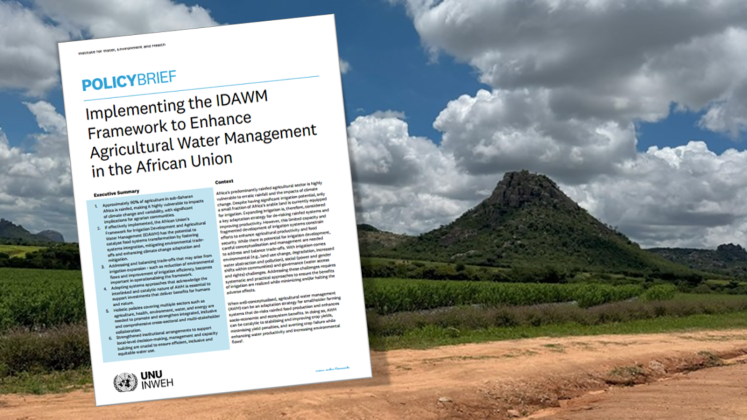Africa's predominantly rainfed agricultural sector is highly vulnerable to erratic rainfall and the impacts of climate change. Despite having significant irrigation potential, only a small fraction of Africa’s arable land is currently equipped for irrigation. A new policy brief by the United Nations University Institute for Water, Environment and Health (UNU-INWEH) - Implementing the IDAWM Framework to Enhance Agricultural Water Management in the African Union – developed in collaboration with Centre on Climate Change & Planetary Health of London School of Hygiene and Tropical Medicine, International Water Management Institute (IWMI), Water Research Commission and the African Union, explores how effective agricultural water management (AWM) can help address these challenges within the Framework for Irrigation Development and Agricultural Water Management (IDAWM).
Expanding irrigation is a key adaptation strategy for de-risking rainfed systems and improving productivity. While there is potential for irrigation development, careful conceptualisation and management are needed to address and balance trade-offs. With irrigation comes environmental (e.g., land use change, degradation, increased water abstraction and pollution), social (power and gender shifts within communities) and governance (water access and rights) challenges. Systematic and practical approaches are needed to ensure the benefits of irrigation are realized while minimizing and/or halting the adverse effects.
While encouraging irrigation expansion, the UNU policy brief highlights the need for a careful consideration of the trade-offs, including the unintended consequences of irrigation efficiency improvements that have resulted in increased water use in many parts of the world.
“Sustainable irrigation isn't just about increasing productivity; it's about balancing environmental, social, health and governance trade-offs to create resilient and inclusive agri-food systems that deliver multiple benefits for people and the planet," said Prof. Tafadzwa Mabhaudhi, Water, Energy, Food and Environment (WEFE) Lead at UNU-INWEH, who led the team of authors.
To address these challenges, the African Union Commission (AUC) has developed the IDAWM Framework, a coordinated strategy to support evidence-based regional and national agricultural water policies to achieve continental food security goals. The IDAWM framework provides a structured approach to identifying AWM challenges, fostering discussions, and setting priorities for sustainable irrigation development. If effectively implemented, the IDAWM Framework could unlock Africa’s agricultural potential and contribute to achieving continental food security goals.
“Unlocking Africa's agricultural potential lies in transforming water, energy and environmental systems – through systematic and responsible agricultural water management and irrigation development, and thinking beyond water, we can mitigate climate vulnerabilities and catalyze food security for millions," said Prof. Kaveh Madani, UNU-INWEH Director.
Key messages:
- Approximately 90% of agriculture in sub-Saharan Africa is rainfed, making it highly vulnerable to climate change and variability impacts, with significant implications for agrarian communities.
- If effectively implemented, the African Union's Framework for Irrigation Development and Agricultural Water Management (IDAWM) can catalyse food systems transformation by fostering systems integration, mitigating environmental trade-offs and enhancing climate change adaptation and mitigation.
- Addressing and balancing trade-offs that may arise from irrigation expansion - such as reduction of environmental flows and improvement of irrigation efficiency, becomes important in operationalising the framework.
- Adopting systems approaches that acknowledge the interlinked and catalytic nature of AWM is essential to support investments that deliver benefits for humans and nature.
- Holistic policies covering multiple sectors such as agriculture, health, environment, water, and energy are needed to promote and strengthen integrated, inclusive and comprehensive cross-sectoral and multi-stakeholder collaboration.
- Strengthened institutional arrangements to support local-level decision-making, management and capacity building are crucial to ensure efficient, inclusive and equitable water use.
Download the policy brief:
“Implementing the IDAWM Framework to Enhance Agricultural Water Management in the African Union”
The UNU research team is available for interviews:
- Prof. Tafadzwanashe Mabhaudhi, Lead, Water, Energy, Food and Environment (WEFE), UNU-INWEH, tafadzwanashe.mabhaudhi@unu.edu
- Prof. Kaveh Madani,Director, UNU-INWEH, kaveh.madani@unu.edu
- Sogol Jafarzadeh, Gender and Capacity Building Focal Point for Africa, sogol.jafarzadeh@unu.edu




